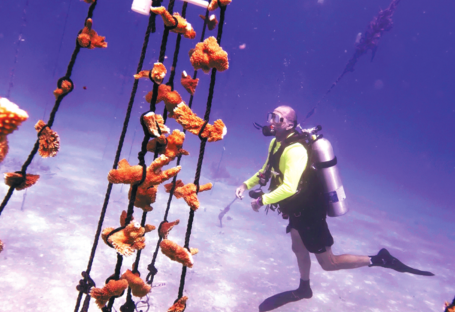Heat stress causing Florida's corals to perish quicker

FLORIDA — The coral reef off southeastern Florida is experiencing an unprecedented and potentially deadly level of bleaching this summer because of rising ocean temperatures caused by climate change, federal scientists said on Thursday.
Some sites around the Florida Keys are being exposed to twice the amount of heat stress that causes corals to die, and earlier in the year than ever before, scientists from the United States' National Oceanic and Atmospheric Administration, or NOAA, said in a telephone news conference. They said the phenomenon is likely to affect the Caribbean very soon and a global bleaching event could be just around the corner.
"We are quite concerned and worried and stressed about this event," Ian Enochs, a research ecologist at NOAA's Atlantic Oceanographic and Meteorological Laboratory, said. "It's not a normal thing."
Ocean surface temperatures off the Florida coast have risen to above 32 C this summer, but scientists said they will not know the extent of damage until early next year.
The Florida Coral Reef is the world's third-largest, extending about 563 kilometers from the Dry Tortugas in the Gulf of Mexico to St. Lucie Inlet, about 185 kilometers north of Miami. The coral reef ecosystem sustains thousands of marine life species, protects against erosion and supports tourism based on scuba diving, snorkeling and fishing.
Coral reefs are made up of tiny organisms that link together. The reefs get their color from the algae that live inside them and are the corals' food. When temperatures get too high, the corals expel the algae, making the reefs appear white or bleached. That does not mean they are dead, but the corals can starve and are more susceptible to disease.
Already, there is coral bleaching along the Pacific coasts of Colombia, Costa Rica, El Salvador, Mexico and Panama, as well as along the Atlantic coasts of Belize, Cuba, Puerto Rico and the US Virgin Islands. Sharks have disappeared off the coast of Oaxaca in Mexico, because of the water temperature.
"Florida is just the tip of the iceberg," Derek Manzello, coordinator of NOAA's Coral Reef Watch program, said. "The scale of this event is very alarming."
At this point, a tropical storm or hurricane — although undesirable for other reasons — would be the best way to cool the waters and limit the damage, Manzello said.
"Unless we have significant changes in weather patterns, we are marching toward heat stress for the Caribbean in a matter of days or weeks," he said.
Agencies Via Xinhua

Today's Top News
- Autonomous region's 60th anniversary starts new chapter for beautiful Xizang
- Xi leaves Xizang after attending region's 60th founding anniversary celebrations
- Xi attends grand gathering to celebrate Xizang autonomous region's 60th founding anniversary
- V-Day parade to unveil advanced weapons
- Intertwined economies, diverging systems
- PV industry gets ready for next phase






























